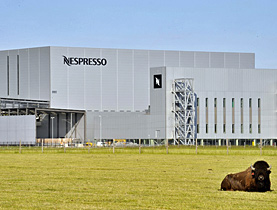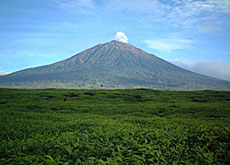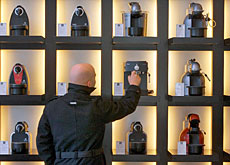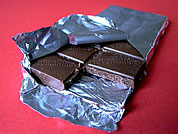Nespresso plant opens in Avenches – where else?

Swiss food giant Nestlé has inaugurated a second Nespresso factory in canton Vaud to meet fast-growing global demand for its pioneering coffee capsules.
The SFr300 million ($275 million) state-of-the-art plant at Avenches, north of Lausanne, can produce 4.8 billion coloured pods a year. Overall production could double to nearly ten billion capsules within three years, according to Nespresso.
Nestlé’s fastest-growing product should record double-digit growth this year despite the economic crisis, said Nespresso’s Chief Executive Officer, Richard Girardot.
“We are very confident about double digits for 2009,” the CEO told a news conference in Avenches on Wednesday.
“We have weathered the storm relatively well,” he said, adding that growth had slowed in the United States, without giving details.
The company, whose “Nespresso – what else?” adverts outside the US feature Hollywood heartthrob George Clooney, has expanded by 30 per cent each year over the past decade. Its annual sales now exceed SFr2 billion, Nestlé said.
As Nespresso is growing so fast, Girardot said it is already thinking about where to locate its next major production site, possibly in one of its biggest consumption centres.
He said the company still expected to grow fast, especially in markets like Germany and France, noting that 90 per cent of sales are in Europe compared with just five per cent in the Americas and five per cent in Asia.
He said Nespresso also hoped to break into tea-drinking China, focusing on big cities like Shanghai and Beijing.
“Where there is an urban lifestyle, that is where we could do business.”
Exclusive
Nespresso is an attempt by Nestlé to turn Italian coffee culture into a well-packaged Swiss concept, offering a selection of individual, sealed pods of premeasured “Grand Cru” ground coffee, futuristic coffee machines and exclusive personalised customer services.
The brand’s popularity can largely be explained by Nespresso’s ease of use and quality. You pop a small coloured aluminium capsule into a stylish coffee machine, press a button and hey presto: a homemade espresso – albeit a pricey one – without any mess or complications.
Another possible reason for its success is that the pods only work in Nespresso machines, which are also produced by manufacturers including Turmix, Jura, Miele and Siemens.
Nespresso’s lifestyle marketing, with George Clooney and its exclusive club, could be another reason behind the company’s spectacular growth.
Consumers are automatically enrolled into a loyalty programme and receive a glossy lifestyle magazine that reinforces the idea that they belong to a select club.
A key element of this exclusivity is that, unlike many of its competitors, Nespresso does not sell its coffee capsules via retailers. Instead, customers buy the pods and machines direct from select Nespresso “boutiques”, online or over the phone.
Girardot said 47 per cent of sales are currently online, 35 per cent in its boutiques and 18 per cent by phone, adding that he expects 180 boutiques to be open by the end of 2009, up from 163 today.
Roman Empire
The new 400,000 square metre factory in Avenches, the former capital of Roman Switzerland, should add 600 jobs by 2012, making it the region’s largest employer, the company said.
Avenches was chosen as the site of Nespresso’s second production facility for its closeness to the other factory at Orbe, also in canton Vaud, which has facilitated knowledge transfer.
It is also close to the Geneva-Lausanne-Bern motorway and train line, and for reasons of economic promotion the firm will reportedly not pay taxes for ten years.
But not everything is perfect in the exclusive world of Nespresso. Critics say that like all big coffee firms, Nestlé does not pay coffee farmers enough for its crop.
“Nespresso’s advertisements are so glossy and seductive that the consumer can forget there was ever a coffee farmer in the first place,” filmmaker Nick Francis, who co-directed Black Gold, a recent documentary on the global coffee industry, told the BBC.
“Partnership”
But Nespresso argues that 35 per cent of its coffee is now bought under a scheme called AAA Sustainable Quality.
“It’s a kind of partnership,” Pascal Hottinger, director of Nespresso Switzerland, told swissinfo. “We get best-quality beans over the long term and they get a higher price [ten per cent more than premium market prices] and agricultural know-how.”
Nespresso says it expects 50 per cent of its coffee to reach this standard by 2010.
Another criticism of the coloured pods is that they are environmentally unfriendly, as most people just throw them in the rubbish bin.
Nespresso says it has a “model” recycling system in place in Switzerland, where 63 per cent of capsules are recycled, and it hopes to extend this initiative to other countries, in particular to France, Spain and Germany via local partners.
Simon Bradley in Avenches, swissinfo.ch
Nespresso was launched in 1986. The company now employs more than 3,900 people worldwide.
Over the past decade it has enjoyed average growth of 30 per cent. In 2008 turnover was SFr2.2 billion – Nestlé’s fastest-growing business.
Nespresso belongs to Nestlé’s “other food and drink” section, which grew in the first three months of 2009 to SFr4.4 billion.
There are currently seven million Nespresso Club members in 50 countries.

In compliance with the JTI standards
More: SWI swissinfo.ch certified by the Journalism Trust Initiative





You can find an overview of ongoing debates with our journalists here. Please join us!
If you want to start a conversation about a topic raised in this article or want to report factual errors, email us at english@swissinfo.ch.